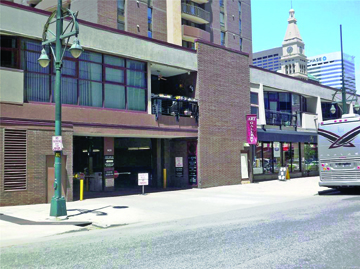
by Mark Smiley | Apr 27, 2018 | Main Articles
by Glen Richardson

Tower Price Power: Soaring parking cost isn’t just in new high-rise condos. A space in the Brooks Tower on 15th St. sold last year for $67,000, the third highest. The 42-story condo tower is the city’s first high-rise residential building.

Spire Price Spiral: The height of living in this 42-story condo building downtown comes with soaring prices. A single parking space in the garage at the high-rise on 14th St. has sold for $74,000, a new record price to park and live downtown.
A single parking space in the ritzy 42-story Spire high-rise downtown on 14th St. has sold for $74,000. The outlay sets a new record for the price to park and live in a condominium home in the heart of downtown.
Space 131 in the garage of the condo tower — a chic retreat in downtown’s Theatre District — topped the previous $70,000 price tag set last June for another Spire space, according to BusinessDen who first reported the sale. The city’s homepage for business news said broker-owner Mark Trenka of Century 21 handled both Spire deals. The third priciest was a $67,000 sale last May in the Brooks Tower on 15th St., the city’s first high-rise residential building. Trenka also represented the buyer in that deal.
While Valley residents regularly confront parking predicaments, most hope to get lucky on the street or opt to rent a spot. People who have condos in the heart of downtown, however, in certain cases have the option of buying a space in their building’s parking garage. They just have to be ready to shell out what you would pay for a 2017 Maserati Ghibli S Q4 for the privilege.
Parking Poker
Pricey parking — spaces on the resale market regularly sell for from $25K to upwards of $55K — provides a metaphorical look at how the price for parking is adding to the cost of living under the city’s Denver Moves transportation arrangement. Mile High’s bike and pedestrian plan has installed dedicated bike lanes throughout downtown thoroughfares, a move that’s gobbled up scores of parking spaces created for residents and tourists on Denver’s streets.
Then there’s Cherry Creek North: Apartment towers, condos and hotel construction in the once swanky shopping district forced the Cherry Creek Shopping Center to implement a paid parking system to protect the mall’s parking for its own customers. Commuters, construction workers and people living or shopping in Cherry Creek North used the 5,001 mall parking spaces, making it tough for mall patrons to find a spot.
Most residents literally pay for par king even if they don’t use it. If you live in a condo or apartment that includes parking, that parking comes with an extra fee or is tucked into your mortgage or rent. Moreover, many multi-family residential buildings have more parking than their residents require. Someone has to pay for those spaces. Someone also has to pay for the fact that a $75 monthly parking fee doesn’t fully cover the cost of creating it.
king even if they don’t use it. If you live in a condo or apartment that includes parking, that parking comes with an extra fee or is tucked into your mortgage or rent. Moreover, many multi-family residential buildings have more parking than their residents require. Someone has to pay for those spaces. Someone also has to pay for the fact that a $75 monthly parking fee doesn’t fully cover the cost of creating it.
Spending Spiral
Spire originally offered no parking spaces to potential buyers despite having seven levels of parking. Thus, today when buyers look at condo resales they might find two, one or no parking spaces for any given unit. This trend in parking is allowing sellers to experiment with how they sell their units. It’s possible to break apart a condo from the parking space to seek an increased total sales price. This becomes especially true when a buyer is willing to spend $70K for a particular single parking space where they live.

Privileged Parking: Buyers at the under construction Laurel Cherry Creek won’t have to contend with the street parking crunch as the purchase includes parking. The 11th floor penthouse buyer will get three parking spaces for just under $4 million
It can, however, be difficult to get a mortgage for just a parking space. Most non-cash buyers opt for a loan on the value of another property they own, or reappraise the condo based on the addition of a parking space, and then get a mortgage based on that new figure. Individuals who purchase a parking space will likely owe more in HOA fees since they will then own a slightly greater percentage of the building. According to Century 21’s Trenka, a space in Spire’s garage comes with $22.68 in monthly HOA fees. At Brooks Tower that figure is $79.36 a month.
Many buildings assign at least one parking space to a unit, but often offer additional spaces as sales incentives once site sales begin. That’s why future buyers at a particular condo may only find one space offered. In some cases, of course, the original buyer may have opted out of purchasing a second space. At Denver’s Glass House condos in LoDo additional parking spaces originally sold for $15K, but were later increased to $40K. Pricey condos, nevertheless, typically include parking spaces. In Cherry Creek North at the still under construction Laurel Cherry Creek Condos, the 11th floor penthouse comes with three parking spaces for just under $4 million ($3,999,467).
Density’s Price
How much does a parking spot add to a condo mortgage or an apartment’s rental fee? Experts say there is no single answer to the question. Construction costs are affected by soil conditions, zoning requirements, site constraints and the type of parking to be built. Furthermore, initial capital cost varies based on property taxes and cost of financing. For rental properties, resident turnov er and delinquency rates are added factors.
er and delinquency rates are added factors.
Seemingly cheap parking at apartment complexes can be costing renters as much as $250 a month. The point: an apartment with parking space costs more to build than one without. The typical fees for apartment buildings don’t generally cover that difference. In many cases developers create more parking than a building actually needs so they have the option to convert to condos as the market changes.
Bottom line: parking spaces are becoming more valuable as density downtown and throughout the Valley builds up and parking options become limited. This is exposed by the increase in the resale prices for parking spaces and the lack of supply. Residents — whether owners or renters — are increasingly likely to see “Parking Space wanted” signs on the building message board. Moreover, as the price of parking spots soars condo “Parking Space for sale” signs are increasingly likely to also be listed.
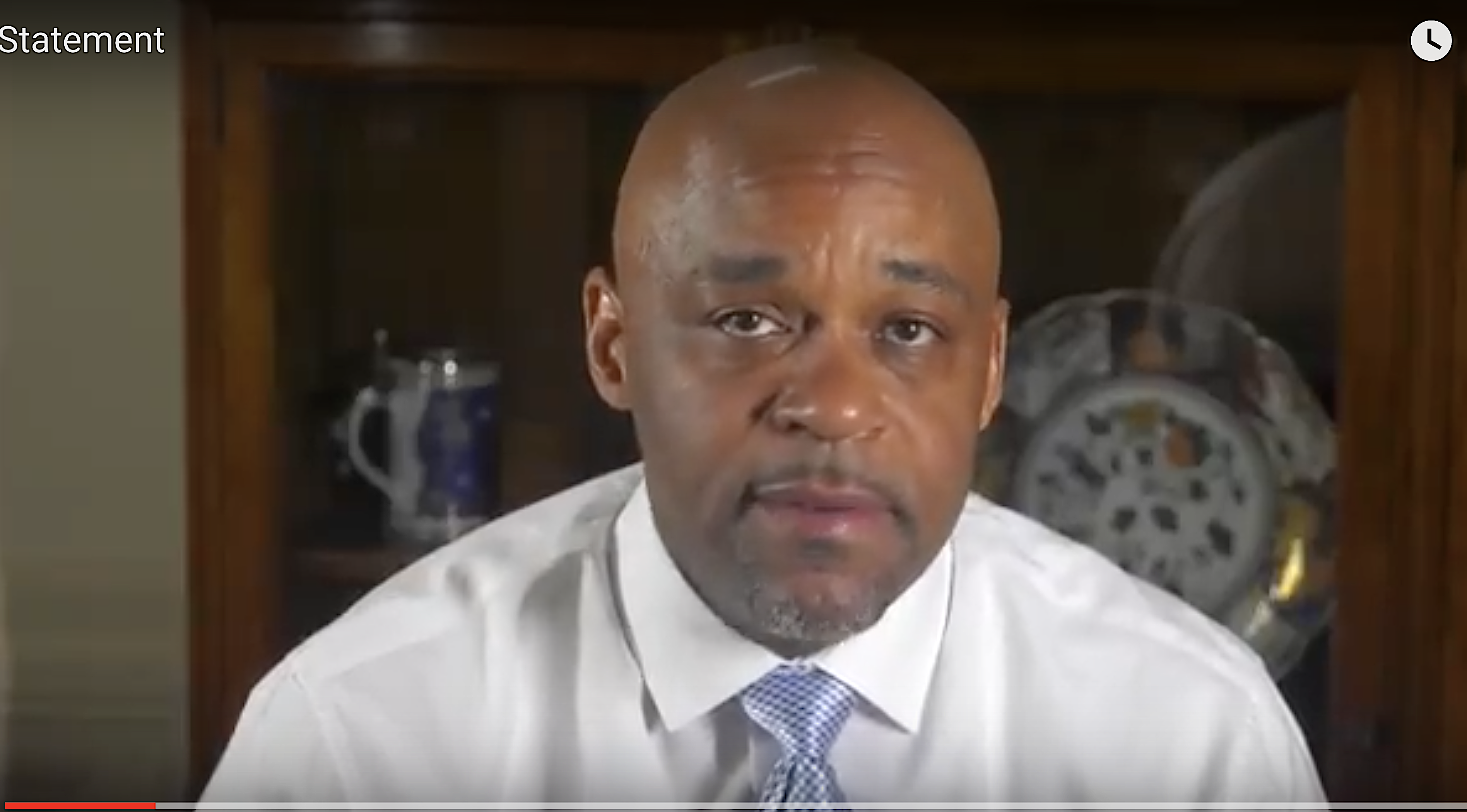
by Mark Smiley | Mar 23, 2018 | Main Articles
Police Union, Sheriffs’ Union, Latino Activists, Women’s Groups Demand Investigation And/Or Resignation Of Mayor
by Charles C. Bonniwell
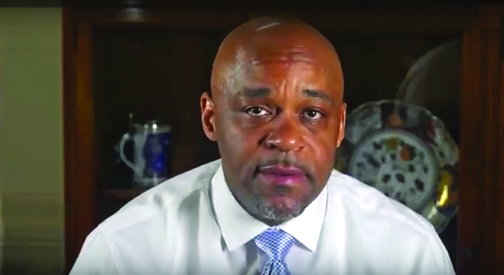
Mounting Scandals: Denver Mayor Michael Hancock has been met with increasing calls for his resignation over a myriad of sex scandals including the sexual harassment of Detective Branch-Wise and being a john at Denver Players/Sugar brothel.

Accuser: Denver Police Detective Leslie Branch-Wise has accused Mayor Michael Hancock of sexually harassing her while she was on his security detail in 2011-2012.
Denver Mayor Michael Hancock has been inundated with sex scandals over the last month. His latest troubles began on February 27, 2018, with Channel 7 News investigative reporter Tony Kovaleski’s explosive interview with Denver Police Detective Leslie Branch-Wise who had been on the Mayor’s security detail beginning after his election in 2011.
Branch-Wise accused Hancock of sexually harassing her and provided on air texts of text messages he sent to her including one which stated:
“So I just watched this story on women taking pole dancing classes. Have you ever taken one? Why do women take the course? If not have you ever considered one and why? Your thoughts?”
“Be careful, I’m curious. LOL!”
Hancock Defense
Hancock would issue a video apology to Wise-Branch stating: “During Detective Branch-Wise’s time on the security team, we became friends, but my text messages in 2012 blurred the lines between being a friend and being a boss.” While Branch-Wise accepted the apology, she declared she has many “friends” and none of them send her salacious harassing text messages.
Branch-Wise was paid $75,000 in July 2013 by the City for unclear reasons since she never filed a complaint, and some critics have claimed the payment was simply “hush money” to prevent Branch-Wise from revealing the mayor’s actions.
In the video the mayor claimed that Branch-Wise had complained to him that Wayne McDonald had sexually harassed her and that he had him fired four days later. That statement by Hancock, however, will result in a federal lawsuit being filed “soon” against the mayor by Wayne McDonald according to McDonald’s attorney William Sultan for defamation and breach of a non-disclosure agreement.
McDonald Under The Bus
McDonald had been the best friend of Hancock. They went to school together at Hastings College in Nebraska and both had worked at the Urban League in Denver. Immediately after being elected mayor, Hancock had the city hire McDonald for an $85,000 amorphous job position which critics claim was little more than keeping the mayor company during the day.
In 2012 McDonald went to lunch at Racines Restaurant with then City Attorney Doug Friednash (an attorney from the law firm of Brownstein Hyatt Farber Schreck [the “Brownstein Law Firm”] and the Denver Manager of Safety Stephanie O’Malley (the daughter of former Denver Mayor Wellington Webb). He was told that he could quit his job or be fired for sexual harassment against Branch-Wise. McDonald protested his innocence and demanded an honest investigation and a hearing to clear his name but they refused. The Mayor’s spokeswoman Amber Miller then went public saying he was fired for serious misconduct and sexual harassment.
McDonald sued Hancock in federal court claiming that Hancock had lied simply to hide his own misconduct regarding Branch-Wise.
In 2016, on the eve of trial, the City settled, paying McDonald $200,000 and each side agreed not to disparage the other which McDonald indicates the mayor has violated as well as failing to disclose the damning text messages to Branch-Wise and McDonald.
City Council Weighs In — Kinda
District 1 City Councilman Rafael Espinoza sent a scathing letter to the mayor’s office calling for an independent investigation to “remove the cloud forming over your administration” regarding the payments to Branch-Wise and McDonald. A day later, however, the City Council went into an executive session, therefore not open to the public, which produced a statement by Hancock ally and City Council President Albus Brooks on behalf of the City Council saying they were declining to call for an investigation in order not to “re-victimize” Branch-Wise.”
The Albus Brooks gambit failed to quiet the uproar when Branch-Wise went back on the air on Channel 7 with Tony Kovaleski to declare that no one from the City had asked her whether she wanted an investigation and she did, in fact, want one. That statement forced the Council President to scramble and declare that the City Council would look into its options on the matter.
Angry Law Enforcement And Latino Rally
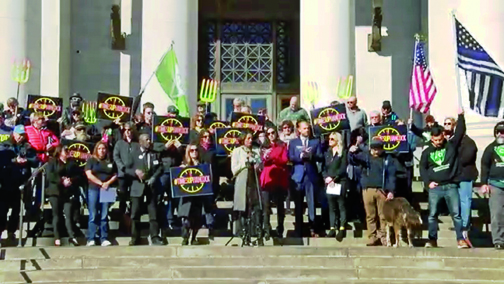
Resignation Demand: Lisa Calderón of the Latino Colorado Forum along with feminist groups across the city rallied on the steps of the Denver City and County Building demanding the resignation of Mayor Michael Hancock. The Mayor was conveniently not in his office at the City and County Building that day.
In the meantime on March 3, 2018, the Colorado State Lodge – Fraternal Order of Police, which represents the Denver Sheriff’s Deputies and is the largest organization representing law enforcement in Colorado, wrote a letter to Governor John Hickenlooper demanding a change in of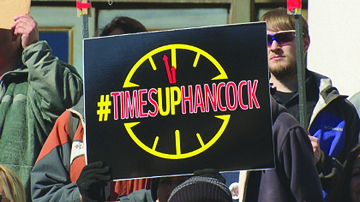 fice of Mayor in Denver along with the Safety Director, the Police Chief and the head of the Sheriff’s Department.
fice of Mayor in Denver along with the Safety Director, the Police Chief and the head of the Sheriff’s Department.
The letter outlined eight scandals in the Police Department and nine in the Denver Sheriff’s Department during Hancock’s time in office. In the meantime the Colorado’s Police Protective Association (PPA) issued its own statements supporting Branch-Wise and castigating Mayor Hancock along with Police Chief White. The PPA had previously passed a resolution of “no confidence” in Police Chief White.
On March 7, on the steps of the City and County Building, a rally headed by Lisa Calderón of the Colorado Latino Forum was held demanding the resignation of Mayor Hancock for sexual harassment which was covered all by of the major media in Denver.
The Return Of Scottie Ewing
As if Mayor Hancock did not have enough problems, an old nemesis, former brothel owner Scottie Ewing, reappeared on radio host (710 KNUS) and Chronicle columnist Peter Boyles’ top-rated morning show. Just before the June 7, 2011, mayoral runoff Ewing charged that Hancock was a patron of the

Sugar Man: Scottie Ewing has returned to prominence with audiotapes accusing Mayor Hancock of being a john at his former brothel house in Denver.
brothel he ran at 1675 Fillmore Street called Denver Players/Sugar. Two years previously, Chief Judge of the United States District Court

House Of The Rising Sun: 1675 Fillmore Street, the former site of Denver Players/Sugar, a brothel run by Scottie Ewing that Mayor Hancock has been accused of being a john in.
Edward Nottingham had to resign his judgeship after it was revealed by Debra Sherman of Channel 7 News that he had been a “john” at that brothel.
The Denver Post and Channel 9 News, at the time, had a joint working relationship. Both agreed to hold the Ewing story about Hancock being a patron of the brothel until after the election, based on Hancock’s promise to provide proof that it was a lie based on his cell phone and bank records.
However, once Hancock had won the runoff against Chris Roemer, he reneged on the promise with his co-campaign manager Evan Dreyer declaring, “A lot has changed in a week.” In a blistering Denver Post front page story on Saturday, June 11, 2011, written by lead reporter Chuck Plunkett, it showed that Hancock’s claim that he would be “open, honest and transparent” about being a john was, in fact, a lie.
The Denver Post and Channel 9 had requested under the open records act that Police Chief Gerry Whitman produce a copy of the video of Hancock’s car parked in front of the brothel and his entering the premises, which police sources had told Debra Sherman of Channel 9 News existed.
Unscrupulous Law Firm
The Brownstein Law Firm’s managing partner Bruce James, another co-chairman of the Hancock campaign, declared that Hancock had nothing to hide and joined in the request of the police chief. But Channel 7 discovered that immediately after that request, James had surreptitiously sent a second letter in which he instructed Whitman to give all such video evidence secretly to him and not tell the public of that fact.
But suddenly on June 15, 2011, The Denver Post declared it had looked at what many believe were scrubbed records at the Brownstein Law Firm and declared that there was “nothing incriminating” about Hancock in any of the records they looked at, basically absolving Hancock.
Channel 9 refused to run Debra Sherman’s story with a prostitute identifying Hancock as her john at the brothel and Channel 9 allegedly threatened her job if she persisted in trying to promote the story. Sherman was later fired by Channel 9.
The Denver Post And Plunkett Disgraced
Rumors of a coverup by The Denver Post in return for significant financial backing by the City and County of Denver have persisted for years. The city took over all of the Post’s downtown office space relieving The Post of an enormous financial burden. While approximately 90 percent of The Post’s staff have been let go since 2011, Chuck Plunkett has not and, in fact, he was made the Editorial Page Editor, a job some claim he is manifestly unqualified for. He has been referred to by some

Dirty Journalist?: Chuck Plunkett, The Denver Post’s editorial page editor, was caught on tape proving he in fact knew that Mayor Hancock was in all likelihood a john at the Denver Players/Sugar brothel. Plunkett has been accused of covering this fact up and has retained his job at The Denver Post while 90 percent of the staff has been cut.
in the media as a “dirty reporter” who sold out his journalistic scruples in order to retain his job.
When Ewing reappeared in March of this year on the Peter Boyles Show, he brought with him audiotapes of his interaction with Plunkett and Sherman, seeming to confirm that Plu

Caught On Tape: Scottie Ewing appeared on Peter Boyles Show in March and he brought with him, audiotapes of his interaction with Plunkett and Sherman seeming to confirm that Plunkett was indeed a “dirty reporter.”
nkett was indeed a “dirty reporter” who, in fact, knew that Mayor Hancock was in all likelihood a john at the Denver Players/Sugar brothel.
An embarrassed and seemingly humiliated Plunkett wrote a defense of his actions in the March 9, 2018, edition of The Denver Post titled “The so-called Denver Post ‘Handcock’ cover-up” claiming that his and The Post’s actions “were and are defensible.” Few in the media have been convinced by his column with some calling it “sad and in many ways pathetic.”
Re-elections Chances Damaged
With Peter Boyles continuing to cover the story on his radio program, the ongoing revelations in the multiple Hancock scandals along with Mike Roberts at Westword and Tony Kovaleski at Channel 7 News, many political observers believe that Hancock’s re-election chances next spring have been badly damaged. While Hancock may not be forced to resign, it is believed that the high-density developers and others that allegedly control his actions may be looking for another candidate to back. It is believed that their favored choice as a replacement would be City Council President Albus Brooks.

by Mark Smiley | Mar 23, 2018 | Main Articles
by Mark Smiley
The Hilltop neighborhood may be getting a new development on its busiest street, Holly Street, soon. On April 4, 2018, the Denver Planning Board (an 11-person board appointed by Mayor Hancock) will entertain the application for a three-story condominium project to be built to the immediate south of Novo Coffee, High Point Creamery, and Park Burger and north of East Alameda Avenue. The project is

Current View: A current view from Holly Street where the proposed three-story condominium project would go if approved for rezoning. Anna DeWitt and six other homeowners have submitted an application to rezone in order to accommodate a three-story condominium project that some say will stifle traffic even more and create safety issues.
temporarily called Green Flats.
The proposed project will have 27 condominium units, 40 uncovered parking spaces in back, a 20-foot setback from Holly Street, and stand 35 feet high, seven feet higher than the Park Burger business complex. Hilltop is a one square-mile neighborhood bordered by Colorado Boulevard and Holly Street, from 6th Avenue to Alameda Avenue.
Critics say this kind of project does not belong in the neighborhood, especially along Holly Street where 20,000 cars pass by each day according to a 2014 study. This study was done before the building that contains Park Burge

Proposed Development: The proposed site plan calls for three-story brick condominiums spread across .65 acres of land directly north of East Alameda Avenue and south of the building that houses Park Burger.
r was built.
“What happens at Holly and Alameda every day is complete gridlock,” said Denver realtor Denice Reich. “It’s outrageous. A three-story building proposed on a small lot with 27 units and 40 parking spaces on the alley will increase traffic and affect both Hilltop and Crestmoor neighborhoods negatively. The consolidation of seven one-story properties into a three-story high-rise of 27 units is unhealthy. It is like a person gaining 100 pounds in one day. We need another stick building with no lot line and no setbacks like we need a hole in the head.”
Anna DeWitt, a part-time French teacher at North High School, who is leading a group of seven homeowners who own land on the proposed .65-acre parcel, is claiming they are forced to make a decision because of a crack in their sewer system and the general disrepair of their current condos and homes. “We got together, and we decided the best thing we could potentially do is sell to a developer,” said DeWitt. “Because we don’t have the necessary funds to gut the entire place and start from the beginning.”
The current code allows for a two-story condominium building or three-story townhomes which would essentially mean high priced townhomes priced somewhere between $800,000 to $900,000. The applicant, Anna DeWitt, with the assistance of the developer Jason Lewiston, president of Greenius LLC, is asking the planning board to consider allowing a three-story condominium building to be built so she and her neighbors can afford to stay in the Hilltop neighborhood.
These condos would range from one to two bedrooms and one to two bathrooms with anywhere from 740 to 1,200 square feet each. Condos would be priced in the high $300,000s or low $400,000s if the three-story condominium project is completed, and they would have the option to become the first occupants with a special deal afforded to all seven homeowners.
“We as neighbors want to stay in this community and support the middle class and create an affordable home and also completely be energy efficient,” said De

Proponents: Anna DeWitt, left, leads the charge of seven homeowners to sell their properties to Jason Lewiston, right, President of Greenius LLC and rezone the .65 acres to build three-story condominiums.
Witt.
Lewiston proposed a similar project in Boulder called the Boulder Junction Row-houses which would complement Google’s new $130 million campus as residences for their employees. The proposed development sits on 1.85 acres of land at 30th Street near Valmont. It is currently held up in the permitting process with the planning and development department in the City of Boulder.
In Hilltop, there are currently five condominiums and two single family homes on .65 acres of land that would be turned into a 27-unit complex with net zero condos. As zero energy homes (run on solar panels) are becoming more popular, builders and developers are investing in zero energy developments, sometimes referred to as “communities.” And some are building zero energy multi-family apartment buildings and townhouses.
“We’re trying to encourage the neighbors who live here to still live here,” said DeWitt. “We’re hoping to help our environmental issues by creating a net zero building. We want to create something elegant looking. We do not have any desire to completely max out our properties.”
“We’re offering this as a great option,” said Lewiston from Greenius. “If you want something that is appropriate for the neighborhood that looks like gorgeous townhouses from the outside and has moderate sized units, this is the option.”
The alternative, which he gives a 50 percent chance of it being, are four-bedroom townhomes which he says will occupy renters for the most part. No matter what the project becomes, DeWitt and Lewiston know there will be opposition. They already have admitted that Jean-Philippe Failyau, owner of Park Burger, has claimed this will “cast a shadow” over his property.
“There’s an extremely tiny, extraordinarily vocal group of hysterics who say anything you do there is terrible, said Lewiston. “So, we’re going to come out and scream and tear our clothes and shriek at the moon if you want to do it.”
Some opponents came to a neighborhood meeting held on March 21, 2018, at Graland Country Day School. Tomas Hart, Board of Directors of the Cranmer Park/Hilltop Civic Association helped start the meeting indicating they are “expanding circles and trying to get feedback.” Hart has lived near the proposed development for 17 years.
Neighbors that packed the library at Graland were concerned about traffic impact, the new building blocking the sun, increased traffic in the alley behind, and pedestrians being in danger from the increase in residents. John Pratt who lives at 2nd and Holly said, “Nice project, wrong place.”
Other homeowners offered little sympathy with the problems these homeowners face stating that they have spent thousands of dollars maintaining their properties through the years and the seven homeowners should do the same. DeWitt and her fellow applicants, who are mostly school teachers, contest that up until 12 years ago, these properties which were built as rentals between 1953 and 1957, were not maint
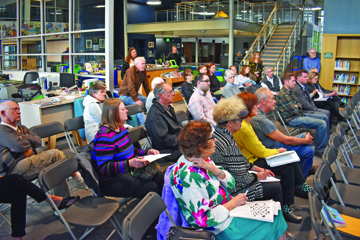
Community Meeting: Neighbors attended a community meeting at Graland Country Day School on March 21, 2018, to learn more about the proposed development on Holly Street. They expressed concerns about traffic, safety, and scale of the project.
ained. More importantly, they cannot afford to engage in major repairs with the salaries they make. And, their Homeowners Association does not have enough saved to do the work.
Knowing they have even more of a battle on their horizon, Lewiston is prepared to act fast if their plan is not approved. “If we get rejected on April 4th, watch what I submit on April 5th,” said Lewiston. “If you think this is bad, see what I’m allowed to do by law. You think you’re upset now? Wait until April 5th comes.” That submission would be three-story townhomes on the parcel of land that currently contains the five existing condominiums.
DeWitt does not share the same fighting spirit as Lewiston. “We want to do what’s best for the community, what’s best for Denver,” said DeWitt. “Something that Denver is suffering from is finding affordable homes for the middle class especially in this neighborhood in particular.”
“I want to be invited back, said Lewiston. “I don’t want this to be my last development here. I want people to drive down the street and say that’s gorgeous, that’s a great gateway to Hilltop. It’s a beautiful project. We’re proud to have it here.” He indicates this project will have the appearance of townhomes that are spread across three lots.
“I personally think this would fit so beautifully into our neighborhood,” said DeWitt. “This is elegant townhomes with a classic design.”
Not everyone agrees with this sentiment. “We have beautiful neighborhoods and they’re destroying them within the last two years,” said Reich.
DeWitt and her fellow neighbors have a lot to gain from selling to a developer and having the rezoning approved. They will benefit by not having to pay for major repairs to their property and the sewer line and they have an opportunity to buy brand new condominiums at a reduced price. “All at the expense of the neighborhood,” said Reich.
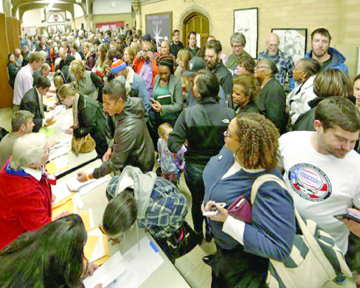
by Mark Smiley | Mar 1, 2018 | Main Articles
by Julie Hayden
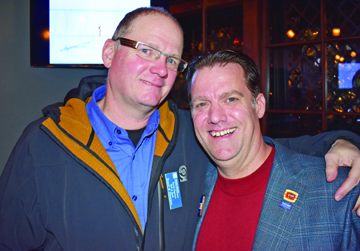
Family Ties: Steve Barlock, right, a GOP gubernatorial candidate is seeking to get on the ballot through the caucus system. He is pictured here with David Peterson, left, owner of the Bull & Bush. They both attended the Greater Glendale Chamber of Commerce Business After Hours at Salvage Restaurant last month. Barlock’s father Ed, an attorney, helped get the Bull & Bush off the ground in the late ’60s and early ’70s.
Colorado Republicans and Democrats are hosting their party caucuses in March 2018. And while the two parties do not see eye to eye on a lot these days they do agree on one thing. The precinct caucuses are a crucial part of the political process.
“When you attend your precinct caucus you can be a deciding vote of who gets on the ballot,” says Denver Republican Party Chairman Jake Viano. “This is where it all starts as to whose name is actually on the ballot. The people at the precinct caucuses are the ones who start the vetting process on all of the possible candidates.”
Mike Cerbo, Chairman of the Democratic Party of Denver, explains, “The precinct caucuses are grassroots democracy and that has a long tradition in this state.”
The caucuses are held the first Tuesday of March, this year that’s March 6, 2018. The precinct caucuses are held in neighborhood locations like schools, libraries or homes. People attend the caucuses to start the process of choosing candidates for the 2018 Democrat and Republican state primary ballots. Delegates are chosen at the precinct level to represent candidates at each party’s various assemblies.

2016 Democratic Caucus In Denver: Both political parties agree Colorado’s precinct caucus system is grassroots democracy at its best.
They will also help shape the party’s platform. “If you want to make the political party better, “Viano says, “Show up at the caucuses. This is where the platform starts. It’s your opportunity to have your voice heard on the candidates and the issues.” Political insiders say it’s also a good way to get to know your neighbors. “It’s a great way to meet like-minded people in your neighborhood,” Viano says.
In Colorado, candidates can get on the ballot by going through the caucus system or by gathering petitions. Some question the caucus system. Colorado’s Republican Party Chairman Jeff Hayes earlier this year sent a letter to county Republican officers in which he wrote: “Our caucus system is arcane and new people are often justifiably paranoid about missing key information or ‘insiders’ controlling access or process.” That drew immediate fire from others who say the precinct caucus system is the heart and soul of our democracy.
Many see neighborhood caucuses as the truest form of grassroots representation. Cerbo says, “Could the process be updated? Maybe. But the rules are tied up in statutory language and it could be hard to make a lot of changes.”
Party officers want to make sure people understand the ballot referendum passed by voters last year to have “open primaries” does not affect the precinct caucuses.
The June 26 Colorado Primary is open to unaffiliated voters this year. But to participate in the March precinct caucuses, you have to have been registered as a Republican or a Democrat since at least January 8, 2018, and at the address in the precinct since February 5, 2018.
Viano says he is pushing for record numbers of people showing up at the Denver Republican caucuses and hopes that enthusiasm continues through the November general election. He says, “We have to show up to help Republicans win statewide.”
Cerbo is also hoping for a strong turnout at the Democrat caucuses. “There is a lot of interest this year.”
Both chairmen advise get there early. The caucuses start at 7 p.m. and you can pre-register starting at 6:30 p.m. They wrap up at approximately 9 p.m.
To determine the location of your caucus and get further information visit www.colo radodems.org or www.cologop.org.
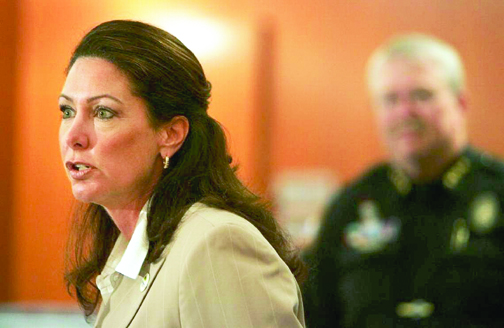
by Mark Smiley | Mar 1, 2018 | Main Articles
by Glen Richardson

Target: Mayor of Hallandale, Florida, Joy Cooper was viewed as an honest and competent mayor of the city since 2011. In 2012 the FBI targeted her and in 2018 filed three felony counts and one misdemeanor charge against her for taking what appears to be minor campaign contributions in 2012. It allowed her political opponent Keith London, apparently favored by the FBI, to take over the city. Many believe that the charges are politically motivated by the FBI and may be similar to the false corruption charges brought by the FBI against Alaska Senator Ted Stevens and former Virginia Governor Bob McDonnell overturned by the U.S. Supreme Court.

Hidden Clues: In a June 2016 guest editorial by Nasrin Kholghy (sister-in-law of Mohammad Ali Kheirkhahi) titled “Truth, Lies and Coverups” she included a rendering of what the proposed project might look like. Numerous readers wrote to the Chronicle, that if you look very closely at the figures in the graphic, above, almost all of the individuals are dressed in Islamic garb. It is not known whether the rug merchants intended that the project in Glendale be largely limited to one group of people and exclude others although no such intent has ever been publicly stated by them.
According to the U.S. Congressional Permanent Select Committee on Intelligence various top FBI officials, including James Comey, Andrew McCabe, Peter Strzok and Lisa Page, had definite preferences on who they wanted to be the President of the United States and allegedly took actions to implement their preference.
Apparently, at the local level, the FBI may also want to be able to select who gets to head up towns and municipalities regardless of who the voters may prefer. Under the Obama Administration the FBI and the Justice Department also got involved in hyper-local zoning decisions under the rubric of fighting Islamophobia as well as other social justice causes. The FBI recently had the Mayor of Hallandale Beach, Florida, removed in order to have her political opponent, favored by the FBI, Keith London become mayor. The FBI may have plotted to do the same in Glendale.
The Denver FBI under Jonathan Grusing, head of the Public Integrity Section appears to have wanted Glendale to approve the building of a massive apartment/condominium building on Colorado Boulevard that was adamantly opposed by Glendale citizens and Denver neighborhoods.
Persons who publicly opposed the Kheirkhahi/Grusing project were harassed and threatened by FBI undercover agent Charles Johnson, at the direction of Grusing, at their homes and places of work. If persons complained about Johnson’s strong-arm tactics to the local police in Glendale and Lakewood, Grusing sent in FBI Special Agent Kimberly Milka to further intimidate them, apparently for the purpose of getting them not to testify against Johnson in court. Possibly the Department basis for attack on everyday citizens exercising what they thought was their constitutional right to oppose a real estate development project, was that Kheirkhahi and his extended family are Islamists. The Obama Justice Department a pparently deemed any such opposition to be a form of Islamophobia even though most of the people who opposed the project had no idea of what religious identity the owners of the land had.
pparently deemed any such opposition to be a form of Islamophobia even though most of the people who opposed the project had no idea of what religious identity the owners of the land had.
Moreover, and perhaps more importantly, Agent Grusing allegedly developed a close personal relationship with Mohammad Ali who, along with family members, owned the Authentic Persian and Oriental Rugs shop along Colorado Boulevard and the associated 3.8 acres of developable land where the massive apartment/condominium project would be built. Kheirkhahi and his related family are all from Iran and have maintained close business relations with relatives and business associates in Iran as well as China and India. It is not known whether Kheirkhahi and/ or family members may also have been FBI informants concerning Iran or the Iranian American community in the United States.
Individual citizens who voiced opposition to the project were hunted down and harassed until Johnson’s arrest by the Glendale Police Department on March 17, 2016.
The FBI demanded Arapahoe County D.A. George Brauchler dismiss all charges against Johnson “for reasons that cannot be disclosed.” Brauchler suspected that something illicit was being undertaken by Grusing and the FBI and demanded that the request be in writing, signed by the Denver Special Agent in charge. He then made the letter a public document. Because of Brauchler’s courageous actions the FBI plot was exposed to the public and became national news due to national investigative reporters like Trevor Aaronson of the internationally respected website The Intercept headed by Glen Greenwald.
After the Glendale Cherry Creek Chronicle reported the opposition to Kheirkhahi’s project Fox 31 News discovered that the offices of the Chronicle were under 24-hour surveillance by undercover operatives presumably under the direction of the FBI.
Johnson had posed as a documentary filmmaker in the Cliven Bundy case in Nevada, and was expected to be a key witness in the Nevada trial until all charges were dismissed with prejudice in January by U.S. District Court Judge Gloria M. Navarro due to massive fraud and misconduct by the FBI and the U.S. Department of Justice. It is not known whether Grusing played any role in the fraud on the court in Nevada.
What was not known at the time was FBI Special Agent Grusing’s plan to remove Glendale elected officials as well as city department heads who opposed his friend Kheirkhahi’s project as the FBI had accomplished in Florida.
Joy Cooper was the mayor of Hallandale, Florida, a small city (population 37,113) on the east coast of Florida in Broward County north of Miami. It is the home of Gulfstream Park Racing and Casino. Ms. Cooper had a reputation as a conscientious and honest mayor in the town, but in 2012 the FBI decided to go after her.
Undercover FBI agents pretended to be wealthy developers and they approached a lawyer friend and supporter Alan Koslow and pretended to seek favor for a project in Hallandale Beach. She met with the undercover agents and the lawyer with the meetings recorded on audio or video. The agents met with Cooper and agents at City Hall and the FBI contends promised favorable treatment in return for two campaign contributions of $5,000 each, one before a primary and one after.
Contribution limits for that election were $500 per person. Attorney Koslow delivered checks from 10 individuals who each contributed $500 for Cooper’s re-election campaign.
What was surprising is the small amount of the purported bribe as campaign contributions. Moreover, bundling of contributions is done throughout the United States and is not illegal. The Mayor of Denver and Denver City Council members take in hundreds of thousands of dollars in campaign contributions from Denver developers, their lawyers and lobbyists and the developers receive extraordinary favorable treatment notwithstanding citizen outrage throughout the city. Taking on mayors of large towns like Denver by the FBI would create political firestorms and thus mayors of small towns are ones more often targeted by the FBI and which fit perfectly with Grusing’s plan.
Perhaps in Hallandale, there is on the tapes, the so-called quid pro quo statement whereby the mayor guarantees approval of the project in return for the relatively small contributions but many in the community are highly skeptical. They note infamous false corruption scandals undertaken by the FBI and the U.S. Justice Department in the case of U.S. Senator from Alaska Ted Stevens and former Virginia Governor Robert McDonnell.
In Glendale, Deputy City Manager Chuck Line reported that persons posing as wealthy foreign developers appeared to repeatedly ask questions of him trying to solicit bribes. Eventually Line concluded that the individuals were undercover FBI agents or informants sent by Grusing seeking a political coup.
In a meeting in Glendale, FBI Agents Grusing and Johnson tried to solicit a Glendale businessman with close financial con
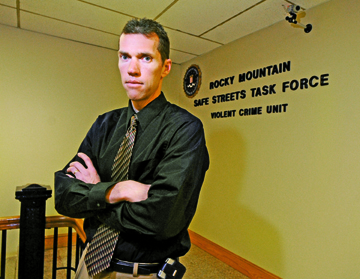
nections to Kheirkhahi to wear a wire and offer bribes to Glendale Mayor Mike Dunafon. The local businessman declined and reported the attempt to local officials. Mayor Dunafon had previously reported other individuals were involved in possible bribe attempts. The Glendale police would report the same to the FBI until they determined it was the FBI who were the ones setting up the bribe attempts.
Why was Special Agent Grusing trying to get officials in Glendale to take bribes? Hallandale Beach, Florida, appears to provide the answer. By charging Cooper, it resulted in Florida Governor Rick Scott removing her as mayor and promoting longtime rival Keith London to be elevated to the spot. If Dunafon would have been charged, then Mayor Pro-Tem Paula Bovo would have become mayor. While Ms. Bovo was ostensibly an ally of Mayor Dunafon, her husband was suspected to be working with the Kheirkhahi family and his car was allegedly spotted in front of their store. He may also have been in regular contact with the FBI.
With Dunafon out of the picture Kheirkhahi’s massive project might easily pass an FBI intimidated City Council. If the charges were found to be fraudulent and Dunafon reinstituted as mayor it would not matter as the prior City Council approval would stand.
The FBI refuses to comment on the allegations related to G

Small Town USA: Hallandale, Florida, is a small town (population 37,113) on the east coast of Florida north of Miami. It was previously best known as the home of Gulfstream Horse Racing Park and Casino until the FBI decided to undertake an undercover sting to replace Mayor Joy Cooper with her political opponent Keith London.
rusing and the Kheirkhahi project and it is assumed if forced to, the agency would claim it was just engaged in monitoring honest and good government. Moreover, it would assert that Grusing’s and Kheirkhahi’s relationship was purely professional in nature. But as the Whitey Bulger case of FBI malfeasance in Boston demonstrated, professional relationships often morph into much more. Since the FBI is accountable at the local level to no one it is likely the exact nature of its assault on the citizens and institutions of Glendale will never be fully revealed. The old Roman saying — Quis custodiet Ipsos custodes (Who watches the watchmen) — has never been so true as it applies to the FBI. The Roman Praetorian Guard was formed to protect Roman emperors but they soon took it upon themselves to remove and replace the emperors with persons selected by them.
Such corruption of the FBI under James Comey has been alleged to have occurred in Washington. If Glendale is any example the rot has infected the lower levels of the bureau also. As Grusing is believed to be a rising star in the FBI, average U.S. citizens may have much to fear in the coming years from their public servants at the Federal Bureau of Investigation.
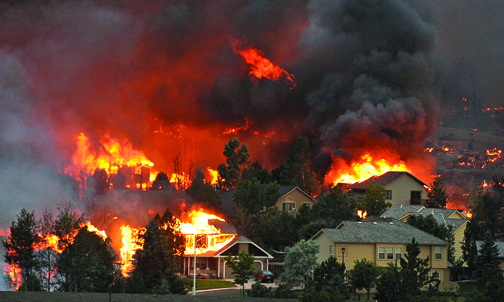
by Mark Smiley | Jan 29, 2018 | Main Articles
Denver Ranked Country’s Sixth Most Endangered City; Audit Finds City Isn’t Disaster Ready
by Glen Richardson

Sparking Fear: Winds and hot, dry weather spark fire danger that can change rapidly. The state’s largest — the Hayman Fire — killed five firefighters, destroyed 133 homes and burned 137,000 acres between Colorado Springs and Denver.

Tornado Alley: Denver has avoided a major tornado but in May 2008, just 59 miles north, the town of Windsor was declared a national disaster. The twister killed one and caused $125 million in damages.
Despite the horrific damage inflicted upon Houston, the Florida Keys and Puerto Rico by hurricanes last year, most Cherry Creek Valley residents think they’re relatively safe from Mother Nature compared to most major metro areas. Wrong: Five counties in Colorado — mostly along the urban corridor — are ranked as very high risks. Fact: Denver is the sixth most endangered major city in the country. Moreover, the likelihood for mass shootings, wildfires and terror attacks are equally likely here as anywhere.
To make matters worse the City of Denver is not prepared to continue non-emergency but mission-essential services in the event of a disaster. In a just released appraisal City Auditor Timothy M. O’Brien, CPA, found that insufficient guidance and training could mean a longer recovery period before city agencies restore vital services after a man-made or natural disaster.
Worst Case Scenario
“If the worst should happen, Denver needs to be ready to respond to keep city services going,” Auditor O’Brien warns. “If we faced an extreme weather event, pandemic, terrorist attack or another disaster, we’d need to know Denver could bounce back and continue serving its citizens.”
Non-emergency, mission-essential operations include a broad swath of services the city provides, ranging from assistance to vulnerable populations to services for citizens.
The audit looked at whether agencies had “continuity of operations” plans that would be effective in the event of an emergency. The pla
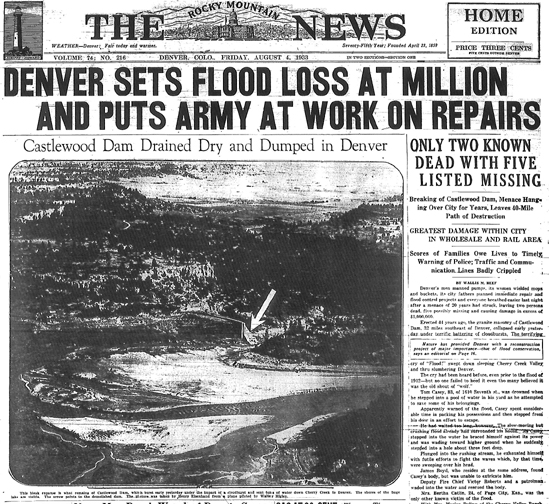
Wacky Weather: Drought combined with prolonged storms can create significant flooding as the Confluence Park photo and headline, above, from an old Rocky Mountain News [August 4, 1933] illustrate.
ns are created as a guid
e so each agency’s personnel know where to go and what to do in the case of an emergency. They are part of a greater “continuity of government” plan for Denver. Emergency services such as firefighters and police are not included in these plans. They are part of a separate emergency preparedness plan. Standards for effective continuity of operations plans are set by FEMA.
Front Line Flaws
After examining the operations of the Office of Emergency Management & Homeland Security, as well as the Office of Human Resources, the audit concluded the city does not have proper planning in place to ensure mission-essential services are up and running after a disaster. For example, the city’s continuity of operations plan lacks critical and up-to-date information. Denver’s continuity of operations plans are incomplete or ineffective according to FEMA standards. These flaws could lead to time-sensitive performance and operation issues, causing increased costs and potential damage to city infrastru
cture, services and reputation.
Mission-essential functions include front-line, time-sensitive services. Many city agencies provide critical services for the health and well-being of some of Denver’s most vulnerable populations, including children who benefit from summer food and after-school meal programs. If a disaster took out everyday functions, everything from paperwork and permitting to other time-sensitive services could fail. This could also mean tax dollars would be wasted if city agencies were not able to do work in a timely manner.
The audit found 29 out of 69 agencies had not reviewed their plans in 2017. Of those 29, three agencies had not reviewed their emergency plan since 2001. Five agenc
ies did not have a continuity of operations plan at all. The audit also found there was no training for the agencies on how to write an effective plan.
Tone At Top
The Office of Emergency Management & Homeland Security is supposed to collaborate with government agencies to help them prepare their continuity of operations plans, as directed by Executive Order 85. The order states all agencies should have these pla
ns. The Office of Emergency Management & Homeland Security is supposed to provide sufficient guidance and training to ensure agencies have complete and effective plans. The agency is also intended to ensure the plans are kept updated.

While the executive order is not specific about when agencies should update their plans, the continuity of government plan and FEMA both recommend annual updates. “The Office of Emergency Management & Homeland Security needs to set a tone at the top to encourage all agencies to make sure they are ready to keep working no matter what happens,” Auditor O’Brien suggests.
The office is primarily funded by federal grants. Recently more money has come from Denver’s general fund as federal funding decreases year after year. In total, the funding for the office continues to decrease. Specifically, the agency’s operating budget dropped from $5.1 million in 2015 to $3.8 million in 2017.
Prepare For Worst
The audit also found there might not be alternate facilities available for some agencies, which would leave employees without a designated place to continue working if they must leave their normal work spaces. The audit team also discovered Denver’s cloud-based continuity planning software contract lapsed for nearly three months. In that time, the files outlining plans to keep the government running could have been lost. Now, the cloud-based continuity of operations planning software is again under contract, but the auditor’s office recommends a review process to update the contract regularly and on time in the future.
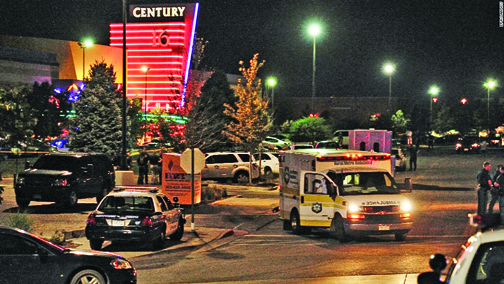
Dark Theater Night: In July 2012 a gunman set off tear gas grenades and shot into the audience killing 12, injuring 70 others.
The audit also identified problems with user access and password setting for the continuity of operations software. The agency agreed to all eight of Auditor O’Brien’s recommendations, including training, regular plan updates and testing for continuity of operations plans.
Auditor O’Brien found that through stronger and more robust continuity of operations plans, agencies throughout the city will be better prepared to continue their operations, provide services and protect city data in the event of a disaster or disruption. The agency has already made significant progress in addressing the audit’s recommendations. “Disasters can cost billions of dollars and devastate lives,” Auditor O’Brien said. “It is important for Denver to be ready for the worst when its residents could need city services the most.”



 king even if they don’t use it. If you live in a condo or apartment that includes parking, that parking comes with an extra fee or is tucked into your mortgage or rent. Moreover, many multi-family residential buildings have more parking than their residents require. Someone has to pay for those spaces. Someone also has to pay for the fact that a $75 monthly parking fee doesn’t fully cover the cost of creating it.
king even if they don’t use it. If you live in a condo or apartment that includes parking, that parking comes with an extra fee or is tucked into your mortgage or rent. Moreover, many multi-family residential buildings have more parking than their residents require. Someone has to pay for those spaces. Someone also has to pay for the fact that a $75 monthly parking fee doesn’t fully cover the cost of creating it.
 er and delinquency rates are added factors.
er and delinquency rates are added factors.

























